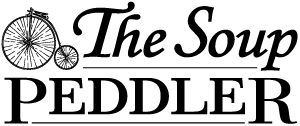Consistency Vs. Creativity
A little peek behind the curtain for you this week... like any business, we have our little internal debates and difficulties. Our business is fraught with its own set of little complexities. In so many ways, the blessings upon this business often reveal the face of a curse. Since we, not unlike many restaurants, sit on the fence which is described by the intersecting line between the spheres of art and commerce (ok, you nitpickers, I know the intersection of two spheres isn't a line, just bear with me), our kitchen is daily torn between two clashing motives: consistency and consistent improvement. Do Soupies want things exactly the same each time, or do they want us to work on improving things? Do we make things the way we think they ought to be, or do we make them the way we think they'll please the most people? What do the answers to these questions say about us as a business, and as artisans?
This week's iteration of the debate was a conversation about last week's gumbo. Those of you who have been following our gumbo over the years have seen it change subtly in different directions. When I personally used to make the gumbo, I would make as dark a roux as I personally had the nerve to do. Sometimes I hit the mark and sometimes missed it. However, the darker the roux, the less body the soup had. Over the next few versions, our chef Justin fixed the issue by making two rouxs... one dark one for flavoring and one lighter one for thickening. This week, Adam aimed for the middle, more like our seafood gumbo roux... he used a different technique for the roux and kept it lighter. It was really good gumbo, and I was proud to serve it... but was it our gumbo? Was it Adam's gumbo? Was it more broadly appealing than a darker roux? Should we take the roux to its limit, put our foot down and say, "this is what we think gumbo is?" But who are we to say what real gumbo is? Is there a real gumbo to the exclusion of others? Is there even an objective reality independent of our observation of the universe?
Sorry about that last one. Kitchen conversations can get a little deep. I decided to read a passage to the culinary staff from Bill Buford's Heat, which is an excellent book detailing his internship at Mario Batali's Babbo Restaurant near NYU. Mario was giving a pep talk to his staff and said, "If someone has a great dish and returns to have it again, and you don't serve it to him in exactly the same way, then you're a ____." You may fill in the blank with your current favorite vilifying profanity. I don't think we'd rate very highly in the eyes of Mario, according to that metric. But that's the never-ending battle between chefs and management. Management is concerned with meeting customer expectations and true chefs are constantly self-motivated to exceed customer expectations. Sometimes they succeed, sometimes they fail. Managers don't like to play dice with a customer's experience, so there's the rub. Control systems versus artistic license.
That's our management challenge, and I guess it's not peculiar to our business. We are all personally here because we don't want a life full of control systems. But somehow we need to reach agreement on what's best for the business... after all, it's incredibly annoying when a business becomes more about the employees than the customers. I guess it's a balancing act that we'll have to continue to embrace. It seems a metaphor for parenting as well... it can't be all control systems (Draconian), but it can't be free reign for the kids (chaotic).
